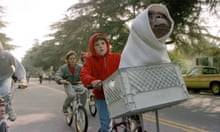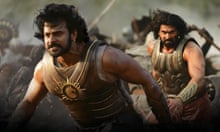Netflix’s new feature film is a big deal in many ways. Called War Machine, it combines the star power of Brad Pitt and the indie credibility of David Michôd, the director of Animal Kingdom. It boasts big themes: the absurdity of war and the ambition of men. Based on The Operators, a book about controversial US army general Stanley McChrystal, the film takes place on a big scale, across Afghanistan and along the corridors of power in DC. An investment in the range of $60m also makes it Netflix’s biggest-budget feature to date. Most of all, though, War Machine is big on expectation: this is the film that could change the industry for ever.
“We knew early on that we were making the kind of movie that doesn’t really get made by the studios any more,” says Michôd. That “we” refers to Michôd, his star Pitt, and the team at Plan B, Pitt’s production company. In 2015, they signed over distribution rights to Netflix in exchange for, says Michôd, “the ability to make films that are unusual and risky with the resources to do it properly”.
Not every section of the film industry has been as receptive. In particular, the Cannes film festival is insisting that, as of next year, all Palme d’Or contenders must be released in French cinemas. Since French law mandates a 36-month window between theatrical release and streaming date, this effectively bars Netflix from the competition. At the Cannes press screening of Okja, a much lower-profile Netflix film starring Tilda Swinton and Jake Gyllenhaal, part of the audience booed Neflix’s logo before the screening had to be stopped due to projection problems. Pedro Almodóvar is on the side of the festival. Will Smith – who stars in Bright, another Netflix film due in December – has spoken out in support of the young upstart. Expect other industry figures to begin taking sides soon.
War Machine will be given a limited, Oscar-qualifying theatrical release in the US and UK, but the big premiere will take place this week on the laptops and in the living rooms of Netflix’s 100m-strong subscriber base. The film’s commercial success will be measured not by its box-office takings, but by new subscriber numbers. As attack plans go, it’s more stealth dominance than shock and awe.
Sydney-born Michôd is the movie journalist turned film-maker who is charged with delivering it. Michôd brought the delightfully dishevelled Ben Mendelsohn to international attention in Animal Kingdom, then artfully scruffed up teen dream Robert Pattinson for 2014’s The Rover. While he may be leading the assault on traditional cinema, Michôd doesn’t look at all like a man who’d fit in with a four-star general’s retinue. His body language is too unassuming, his conversation too considered and his haircut — shoulder-length and in a ponytail — definitely non-regulation.
Still, there are some unavoidable parallels between army generals and film directors. “I can never claim to be in a position where I’m having to make decisions with life and death consequences,” says Michôd. “But I do need to be able to wrangle a gigantic machine.” There is one key difference, though, between waging wars and making movies. While the US military that War Machine depicts seems incapable of changing course once set, the film industry has become anxiously reactive to changing viewer habits. These attempts to keep box-office receipts profitable by second-guessing audience tastes have caused problems for film-makers.
“I went to film school right in the middle of that explosion of indie cinema that came out of the 90s,” says Michôd. “For a long period, there was a whole bunch of guys – Paul Thomas Anderson, David O Russell, Wes Anderson, Spike Jonze – who were getting to make movies with budgets inside the studio system, but movies that were so idiosyncratic. When Animal Kingdom was released [in 2010], it got me a whole load of attention, but those opportunities didn’t seem to exist any more.”
So, it’s not just that Netflix is luring film-makers with its seductive combination of deep pockets and a free rein – it’s that, if Netflix wasn’t stepping in, these films wouldn’t get made at all. In February, it was announced that Martin Scorsese’s next film, The Irishman, would be distributed by Netflix. The film was set up at Paramount, which released Scorsese’s previous four, but the Hollywood studio reportedly got cold feet when the director’s latest, Silence, bombed, grossing just $7m against a $40m budget.
The Irishman is not a 160-minute meditation on the suffering of 17th-century missionaries. It’s a mob thriller starring Robert De Niro, Al Pacino and Joe Pesci, but it still falls in to the category Michôd describes as “any film of scale that isn’t based on a pre-existing franchise”. The Irishman now sits on Netflix’s increasingly impressive feature slate, but War Machine was the first deal signed and the first to be released. That makes it the test case, a pressure Michôd seems to be taking in his stride. Sort of. “Put it this way, it didn’t feel any harder than making my short films – but the shorts felt terrifying.”
You might assume that any film with Pitt attached would be bankable under any circumstance, but Michôd suggests that his central performance as General Glen McMahon (a fictionalised take on McChrystal) is of a larger-than-life kind that’s now considered too big for the big screen. “We had conversations about where to pitch the character and knew quite quickly that there was no point in Brad trying to keep a leash on it. For us, it was about letting the movie be mental.”

Actors love that kind of creative environment and the film features enjoyably left-field performances from Ben Kingsley as Afghan president Hamid Karzai and Tilda Swinton as an awkward German official, as well as an entire battalion of upcoming talent, including Britain’s Will Poulter, Lakeith Stanfield from the TV comedy Atlanta, and Sean Penn’s son Hopper.
“There’s something very fun about working with actors of that age. They’re not totally green, but they’re still hungry. There’s still something exciting about the fact they’re getting to do it at all.” Perhaps, being three feature films in, Michôd can identify? “I just want to make movies. The fear is always that someone’s gonna tell you that you can’t do it any more.”
War Machine may be airing on the small screen but they’ve still gone to the trouble of giving it a big-screen finish. “We did a full sound mix and everything,” says Michôd. “It’s kind of magnificent. I love the possibility of turning the movie into an event.” For the director, this attention to detail is slowly evolving into a new definition of film for television. “I spent almost a year cutting this. It’s that fine chiselling you can do when you have the resources to properly finish something that’s two hours long.”
Undoubtedly, a huge amount of care, time, talent, not to mention money has been poured into War Machine. But will the audience really be able to appreciate the auteur’s artistry on such a small canvas? And does Michôd not feel even a sliver of cinephile regret about the fact that the vast majority of War Machine’s audience will never see it on a big screen?
“I don’t mind at all because people’s televisions are so great these days. I know it’s almost heretical for a director to say they don’t care.” And don’t you? “If I’m completely honest, it’s totally reflective of how I watch movies these days. I like watching movies at home.”
War Machine streams on Netflix from 26 May.







Comments (…)
Sign in or create your Guardian account to join the discussion